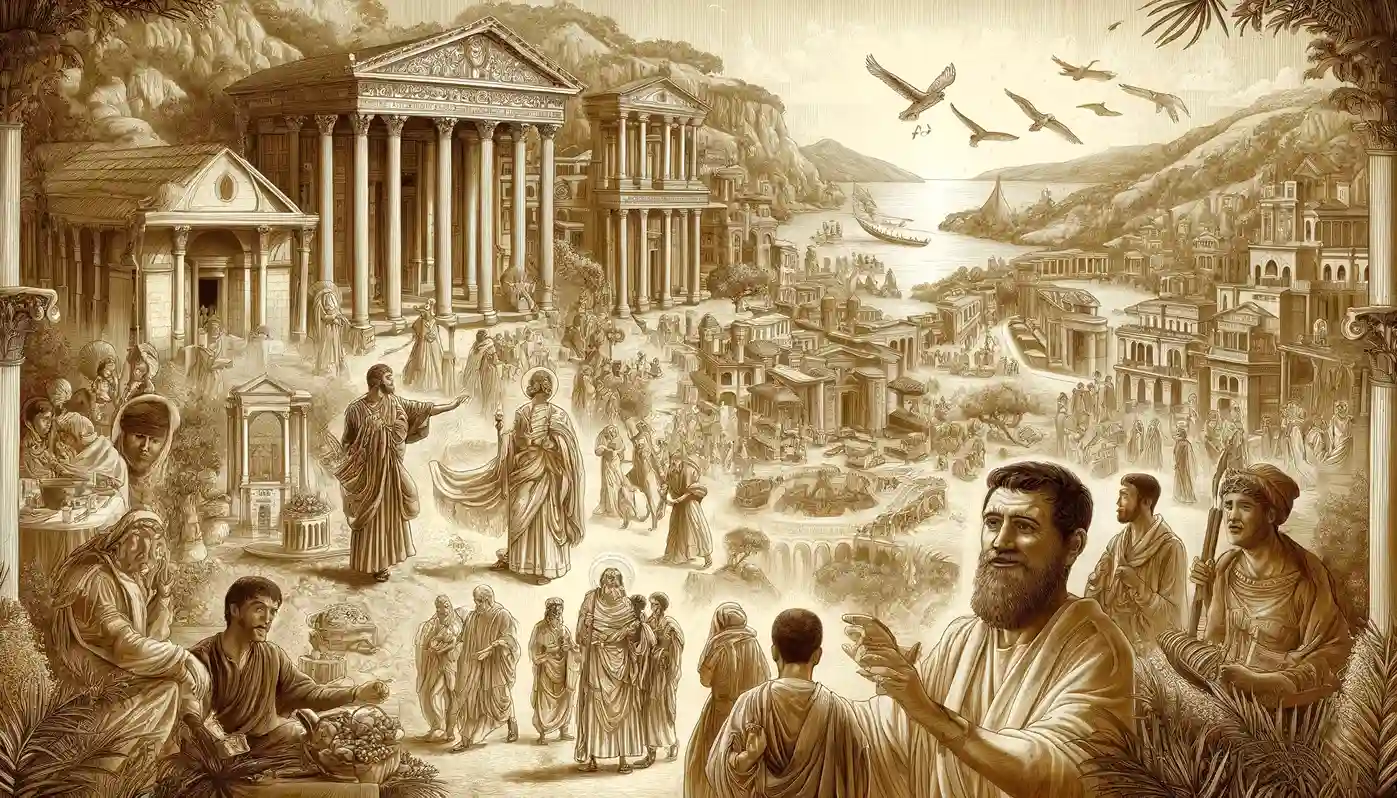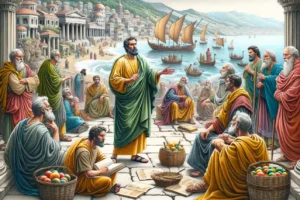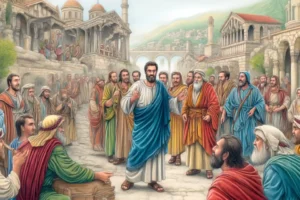
Paul’s Missionary Journeys: Spreading the Gospel Across the Roman Empire
Paul the Apostle undertook several missionary journeys that were pivotal in the spread of Christianity throughout the Roman Empire.
- First Journey: With Barnabas (Acts 13-14), covered Cyprus and Asia Minor.
- Second Journey: With Silas and later Timothy and Luke (Acts 15:36-18:22), expanded into Europe, including Philippi, Thessalonica, Berea, Athens, and Corinth.
- Third Journey: Mainly in Ephesus and revisiting previous locations (Acts 18:23-21:17), focused on strengthening early Christian communities.
- Final Journey to Rome: As a prisoner (Acts 27-28), spread the Gospel to Rome despite hardships.
Paul’s missionary journeys were instrumental in the early Christian church’s expansion, laying the groundwork for Christianity’s spread throughout the Roman Empire. These journeys, chronicled in the Acts of the Apostles, highlight Paul’s dedication, resilience, and strategic approach to evangelism.
First Journey of Paul
Paul’s first missionary journey (circa 46-48 AD) was conducted with Barnabas and John Mark. This journey began in Antioch, a key center for early Christianity.
- Cyprus:
- Salamis: Preached in Jewish synagogues.
- Paphos: Encountered and converted the proconsul Sergius Paulus after confronting the sorcerer Elymas (Acts 13:6-12).
- Asia Minor (Modern-Day Turkey):
- Pisidian Antioch: Delivered a significant sermon in the synagogue, leading to mixed reactions (Acts 13:14-52).
- Iconium: Faced both conversions and opposition, resulting in a plot to stone them (Acts 14:1-7).
- Lystra and Derbe: Paul healed a crippled man, leading to him and Barnabas being mistaken for gods. Later, Paul was stoned and left for dead but survived (Acts 14:8-20).
Second Journey of Paul
Paul’s second missionary journey (circa 49-52 AD) involved Silas, and later Timothy and Luke joined them. This journey marked the first significant expansion into Europe.
- Macedonia:
- Philippi: Converted Lydia, exorcised a spirit from a slave girl, leading to imprisonment and the miraculous conversion of the jailer (Acts 16:11-40).
- Thessalonica: Preached in the synagogue, facing opposition from jealous Jews (Acts 17:1-9).
- Berea: Received more noble reception; examined Scriptures daily (Acts 17:10-15).
- Greece:
- Athens: Engaged with philosophers at the Areopagus, delivering a sermon about the “unknown god” (Acts 17:16-34).
- Corinth: Stayed for 18 months, working as a tentmaker and preaching; wrote letters to the Thessalonians (Acts 18:1-17).
Third Journey of Paul
Paul’s third missionary journey (circa 53-57 AD) focused on revisiting and strengthening the churches he had established.
- Ephesus:
- Extended Stay: Taught for three years, performed miracles, and faced opposition from silversmiths due to the impact on their trade (Acts 19:1-41).
- Macedonia and Greece:
- Revisited churches, collected offerings for Jerusalem’s poor, and wrote letters, including to the Corinthians and Romans (Acts 20:1-6).
- Troas:
- Raised Eutychus: Performed a miracle by raising a young man from the dead after he fell from a window (Acts 20:7-12).
- Farewell to Ephesian Elders:
- Met with the elders in Miletus, delivering a poignant farewell address (Acts 20:17-38).
Final Journey to Rome
Paul’s journey to Rome (circa 60-62 AD) as a prisoner was marked by trials and tribulations.
- Arrest and Trials:
- Arrested in Jerusalem and faced trials before Jewish and Roman authorities (Acts 21:27-26:32).
- Journey to Rome:
- Shipwrecked on Malta, where he performed miracles, including healing Publius’ father (Acts 27-28).
- Arrived in Rome and continued to preach under house arrest (Acts 28:16-31).
Theological Insights
Several key theological themes emerge from Paul’s missionary journeys:
- Divine Guidance: Visions and the Holy Spirit’s leading were crucial in directing Paul’s missions.
- Resilience in Persecution: Paul’s endurance in the face of opposition and suffering underscores the cost of discipleship.
- Inclusivity of the Gospel: Paul’s mission to the Gentiles highlights the universal nature of the Christian message.
- Community Building: Establishing and nurturing churches was central to Paul’s strategy, emphasizing the importance of community in Christian life.
Conclusion
Paul’s missionary journeys were pivotal in the spread of Christianity and the establishment of the early church. His strategic approach, resilience, and dedication laid the foundation for a global faith. Paul’s journeys illustrate the transformative power of the Gospel and the importance of perseverance in the face of adversity.



